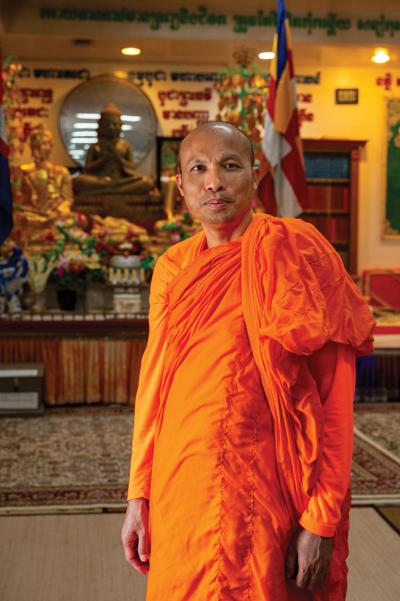
The Venerable Han Hoeung
The Venerable Han Hoeung didn’t always want to be a monk.
“In the beginning, I didn’t want to be a monk at all, but my father was a monk,” Hoeung explains through a translator. “He was a great monk, and well-known. He wanted me, as his son, to continue that legacy. I said to myself that I would — but only for a month or two.”
He laughs as he remembers those younger years, and his own childish folly.
“Obviously, at the age of 14, there are a lot of distractions in your life,” he continues. “You have all this freedom and just kind of so many choices. But it also seemed chaotic at the same time. That’s what attracted me to Buddhism — the moment I was ordained to be a monk, there was peace and calmness. And I thought, ‘I can use this to educate myself and also to educate the people.’”
Hoeung has been a monk for almost 30 years. In June 2021, he moved to Nashville from Cambodia. It’s been quite a transition.
“I had been living in Cambodia most of my life,” he says, “and the country is a developing country. So you see a lot of things in process and in progress. Versus here, where everything seems to be fully established already. Freedom is in abundance.”
He lives among a community of monks at the Cambodian International Buddhist Temple in East Nashville, where he feels comfortable but always enjoys going out into the community. As he did in his home country, Hoeung loves to speak with younger Cambodians living in Nashville about the dharma — the interconnectedness of all life. But unlike in Cambodia, in Nashville he feels a greater freedom to express ideas, especially when it comes to injustices he perceives.
“We’re able to instill a certain type of emotion in [younger generations] that gets them to be so compassionate about their parents and about others that they will cry and become very emotional. And then we try to let them become familiar with that emotion of being compassionate, so that they can always use that and take it with them as they’re growing up.”
“Before the opposition party in Cambodia took power, monks had quite a bit of freedom,” he explains. “If there was injustice, the monks would come together just sort of to be a face for the people. But after the opposition party was dissolved, all monks realized that they cannot say too much.
“When I came here, I realized that I can speak about what I feel is right — especially when it comes to speaking about justice,” Hoeung continues. “You can speak that without having that fear or the sense of oppression that monks now in Cambodia experience.”
Hoeung encourages curious Nashvillians to come visit the temple if they’d like to learn more about the dharma, mindfulness and meditation — as long as a translator is available.
Stories of who these Nashvillians were, who they are now, and who they’re still becoming






